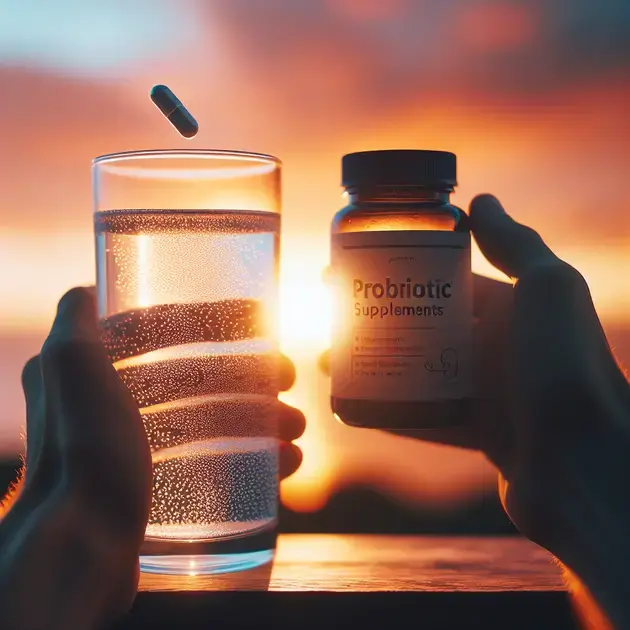Wondering when is the best time to take probiotics? Look no further! In this complete guide, we will cover everything you need to know about the optimal timing for consuming probiotic supplements. With the growing popularity of probiotics, it’s crucial to understand the most effective ways to incorporate them into your daily routine.
Recent studies have suggested that the timing of probiotic intake can impact their efficacy. While probiotics can be beneficial at any time of the day, experts recommend taking them on an empty stomach in the morning for the best results. By following the recommendations outlined in this guide, you can maximize the benefits of probiotics and support your gut health effectively.

Optimal Timing for Probiotic Supplements Consumption
Probiotic supplements are beneficial for gut health when taken at the right time. The optimal timing for probiotic supplements consumption is in the morning, on an empty stomach. This allows the probiotics to pass through the stomach without much interference from food and stomach acid, reaching the intestines where they can be most effective. One recommended way to consume probiotic supplements in the morning is to pair them with a glass of room temperature water, as this helps in their digestion and absorption.
An app that can help you track your probiotic supplement consumption and remind you of the optimal timing is “MySupplements”. This app allows you to set reminders for when to take your supplements and provides information on the best practices for consuming probiotics for maximum benefits.
Another important aspect to consider for optimal timing is to avoid taking probiotic supplements with hot beverages or acidic drinks, as these can diminish the effectiveness of the probiotics. It’s also advisable to wait at least 30 minutes before consuming any food after taking your probiotic supplements in the morning to allow the probiotics to settle in your gut.
Consistency in taking probiotic supplements at the optimal timing is key to reaping the full benefits for your gut health. By incorporating this habit into your morning routine, you can support a healthy digestive system and overall well-being.
If you are unsure about the best time to take your probiotic supplements, consulting with a healthcare professional or nutritionist can provide personalized guidance based on your individual needs.
Benefits of Taking Probiotics on an Empty Stomach in the Morning
Taking probiotics on an empty stomach in the morning offers several benefits for your gut health. When consumed without food, probiotics have a better chance of surviving the acidic environment of the stomach and reaching the intestines in a viable state. This enhances their ability to colonize the gut and promote a healthy balance of beneficial bacteria.
One of the key advantages of taking probiotics in the morning on an empty stomach is the increased absorption of the beneficial bacteria. Without the presence of food in the digestive tract, probiotics can establish themselves more effectively and exert their positive effects on gut health.
An online platform, “GutHealthNow”, provides detailed information on the benefits of taking probiotics on an empty stomach in the morning. The platform offers articles, expert advice, and user testimonials to support the optimal consumption of probiotics for improved gut health.
Incorporating the habit of taking probiotics on an empty stomach in the morning can also help in reducing digestive discomfort and bloating, as the probiotics can work more efficiently when not competing with food for digestion. This can lead to a smoother digestion process and better nutrient absorption throughout the day.
Furthermore, starting your day with probiotics can support your immune system and boost your overall energy levels, contributing to a sense of well-being and vitality. By making this simple adjustment to your daily routine, you can experience the full spectrum of benefits that probiotics offer for your gut health.
Maximizing Probiotic Benefits for Gut Health
To maximize the benefits of probiotics for gut health, it is essential to follow a few key steps. First and foremost, choose high-quality probiotic supplements from reputable brands that contain a diverse range of beneficial bacteria strains. Look for supplements that are labeled with colony-forming units (CFUs) to ensure their potency.
Websites like “HealthyGutLiving” provide comprehensive guides on selecting the right probiotic supplements for your specific needs. These platforms offer product reviews, comparison charts, and user ratings to help you make an informed decision when purchasing probiotics for gut health.
In addition to choosing the right probiotic supplements, it is important to maintain a balanced diet rich in fiber, fruits, and vegetables to support the growth of beneficial gut bacteria. Avoiding excessive sugar and processed foods can help create an environment in the gut that is conducive to the proliferation of probiotics.
Regular exercise and adequate hydration also play a crucial role in maximizing the benefits of probiotics for gut health. Physical activity can support the diversity of gut bacteria, while staying hydrated ensures proper digestion and absorption of nutrients, enhancing the effects of probiotic supplementation.
By incorporating probiotic-rich foods like yogurt, kefir, sauerkraut, and kimchi into your diet alongside probiotic supplements, you can further boost the population of beneficial bacteria in your gut. This synergistic approach can amplify the positive impact of probiotics on your digestive system and overall well-being.

What Time of Day is Best to Take Probiotics
When considering the best time of day to take probiotics, it’s essential to understand how these supplements work within the body. Probiotics are live bacteria and yeasts that are beneficial for digestive health. They help maintain a healthy balance of gut flora, which can support digestion and overall well-being. To maximize the effectiveness of probiotics, it is generally recommended to take them with a meal. This can help protect the probiotic bacteria from stomach acid and bile salts, allowing them to reach the intestines intact.
Some experts suggest taking probiotics in the morning, as this is when the digestive system is most active. By consuming probiotics in the morning, you can help replenish the beneficial bacteria in your gut and support a healthy digestive process throughout the day. However, others believe that taking probiotics in the evening may be more beneficial, as the body focuses on repair and regeneration during sleep, allowing the probiotics to work undisturbed.
Ultimately, the best time of day to take probiotics may vary from person to person. It is recommended to experiment with different times and observe how your body responds. Whether you choose to take probiotics in the morning or evening, consistency is key. By establishing a routine and taking your probiotic supplements at the same time each day, you can support a healthy balance of gut flora and optimize the benefits of these valuable microorganisms.
Remember, always consult with your healthcare provider before starting any new supplement regimen, including probiotics. They can provide personalized recommendations based on your individual health needs and help you determine the best time of day to incorporate probiotics into your daily routine.
The Relationship Between Probiotics and Digestive Health
The relationship between probiotics and digestive health is a critical one, as these beneficial microorganisms play a vital role in maintaining a healthy gut. Probiotics help promote the balance of good bacteria in the digestive system, which is essential for efficient digestion and nutrient absorption. By supporting a diverse microbial ecosystem in the gut, probiotics can help enhance digestive function and contribute to overall well-being.
Research has shown that probiotics may help alleviate symptoms of digestive disorders such as irritable bowel syndrome (IBS), inflammatory bowel disease (IBD), and diarrhea. These supplements can help restore the gut microbiota to a more balanced state, reducing inflammation and improving gastrointestinal symptoms. Additionally, probiotics have been linked to enhanced immune function, as a significant portion of the body’s immune system is located in the gut.
When considering the use of probiotics for digestive health, it is essential to choose high-quality supplements from reputable brands. Look for probiotic products that contain a variety of strains, as different strains offer unique benefits. Additionally, paying attention to the recommended dosage and storage instructions can help maintain the effectiveness of the probiotic bacteria.
Incorporating probiotic-rich foods such as yogurt, kefir, sauerkraut, and kimchi into your diet can also help support digestive health. These fermented foods naturally contain beneficial bacteria that can contribute to a healthy gut microbiome. By combining probiotic supplements with a balanced diet rich in fiber and nutrients, you can promote optimal digestive function and overall wellness.
Tips for Enhancing the Effectiveness of Probiotic Supplements
Enhancing the effectiveness of probiotic supplements involves several key factors that can maximize the benefits of these valuable microorganisms. One essential tip is to choose a probiotic supplement that contains a high number of live cultures, as this indicates the potency of the product. Look for supplements that provide a diverse range of probiotic strains, as different strains offer varying health benefits.
Another tip for enhancing the effectiveness of probiotic supplements is to take them consistently as directed. Establishing a daily routine for taking probiotics can help maintain a steady influx of beneficial bacteria into the gut, which is essential for supporting digestive health. It’s also important to store probiotic supplements correctly, as exposure to heat, moisture, and light can degrade the live cultures.
Supporting your probiotic regimen with a healthy diet rich in fiber and prebiotic foods can further enhance the effectiveness of these supplements. Prebiotics are non-digestible fibers that serve as food for probiotic bacteria, helping them thrive in the gut. By consuming prebiotic-rich foods such as garlic, onions, bananas, and whole grains, you can create an optimal environment for probiotics to flourish.
Lastly, listening to your body and paying attention to how you feel when taking probiotics can provide valuable insights. If you notice improvements in digestion, energy levels, or overall well-being, then the probiotic supplement is likely benefiting you. However, if you experience any discomfort or adverse reactions, it’s essential to consult with a healthcare provider to determine the best course of action.
Conclusion
Understanding the best time of day to take probiotics is crucial for maximizing their benefits. These live bacteria and yeasts play a significant role in promoting a healthy balance of gut flora, supporting digestion, and overall well-being. While some experts recommend taking probiotics in the morning to replenish beneficial bacteria during the digestive system’s peak activity, others find the evening more suitable for uninterrupted absorption during sleep. Experimenting with different times while maintaining consistency can help individuals determine their ideal routine for optimal gut flora balance and microorganism benefits.
The relationship between probiotics and digestive health is paramount, as these microorganisms aid in maintaining a healthy gut ecosystem. Probiotics assist in balancing good bacteria in the digestive system, essential for efficient digestion, nutrient absorption, and managing symptoms of digestive disorders like IBS and IBD. Additionally, probiotics support overall well-being by enhancing immune function, as a substantial part of the body’s immune system resides in the gut.
To enhance the effectiveness of probiotic supplements, consider selecting high-quality products with diverse strains and a high number of live cultures. Establishing a consistent daily routine, following recommended dosages, and proper storage are crucial factors. Combining probiotics with a diet rich in fiber, nutrients, and prebiotic foods like garlic and bananas can create an optimal environment for these beneficial bacteria to thrive, further supporting digestive health and overall wellness. Pay attention to how your body responds to probiotics, noting improvements in digestion and well-being, while promptly consulting a healthcare provider if you experience any adverse effects for personalized guidance.



